Birzeit University Right to Education Campaign 3 June 2006
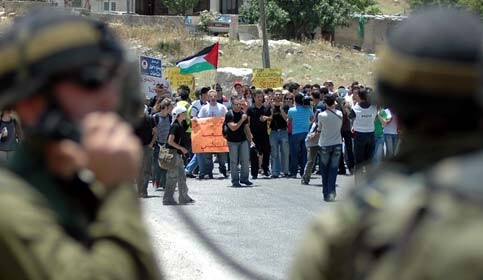
Israeli soldiers take position as Palestinian, Israeli and international students demonstrate during a protest against the checkpoints in Atara Checkpoint near the northern entrance to the West Bank town of Ramallah June 3, 2006. (MaanImages/Fadi Arouri)
In the flurry of letters and comments against the boycott of Israeli academics who, according to Natfhe, are complicit through their work or silence, in the military occupation of the West Bank and Gaza, the reality facing the other side of the coin, that of Palestinian academics, researchers and educational institutions, has been ignored. The crux of the “anti-boycott but pro-peace” argument is that academia is one of the few places where constructive argument is possible, and Israeli academic freedom is the cornerstone for the push for change in Israeli policy and ultimately, for the end of military occupation in the Palestinian territories.
The circle this argument fails to close is that without the freedom of Palestinian education the prospect of any genuine dialogue on the long-term solution to the conflict cannot materialise. And in the absence of a sizeable and meaningful denunciation of Israeli clampdowns on Palestinian education, what other mechanisms are there to awaken the pro-dialogue, pro-peace camp?
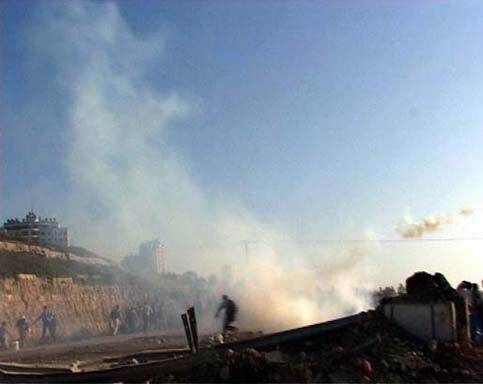
Teargas was fired at the Surda Roadblock, on the road that links Ramallah to Birzeit University, as it was suddenly closed by Israeli occupation forces on 21 May 2003, trapping hundreds on the wrong side of the roadblock. (Birzeit University)
Under Israeli occupation, all eleven Palestinian universities have been closed, the longest being Birzeit between 1988 and 1992, and the most recent, Hebron Polytechnic, which was closed by military order for 8 months in 2003. During these periods community-based classes were criminalized and its teachers and students arrested. Since 2000, 185 schools have been shelled and scores of teachers and students have been shot at and arrested. Then there are the less extreme but just as effective obstacles like the 700 restrictions of movement by checkpoints, road-blocks and earth mounds. Through creating and controlling a system of internal borders in the occupied territories, the Israeli military prevents students from accessing Palestinian universities far from their homes. University campuses are then increasingly ghettoised; Birzeit now attracts the vast majority of its new students from the Ramallah and Jerusalem areas, and its intake of people from Jenin has dropped by 100%. This also means students are limited in their course choices; 12 students from Gaza have been denied permission to go to Bethlehem and study Occupational Therapy (a course not available in Gaza) despite them not representing a security threat to Israel – a point the military admitted at the Israeli High Court where the decision is currently being challenged.
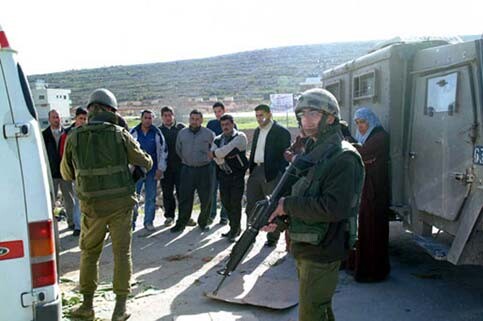
Israeli soldiers harass Birzeit University students outside campus, checking student IDs, on 17 March 2004. (Birzeit University)
However, the latest round of Israeli attacks on Palestinian education has been through the control of its external borders. As an occupying power, Israel is legally responsible for guaranteeing all human necessities and rights in the occupied territories, including the right to education, and is in de facto control of all that goes in and out of the territories, including foreign academics, researchers and students. The procedures that those wishing to study or work in Palestinian universities have to go through are bad at the best of times. Students are often denied entry if they reveal they will be based inside the occupied territories, and refusal on this basis is so common that Palestinian universities even advise students to claim they will be tourists in Tel Aviv instead. While other countries’ foreign students are given visas for the duration of their courses, in the occupied territories they suffer the stress of insecurity and the burden of having to lie – itself in breach of their universal right of access to education. The overall message here is clear: if you want to study, you cannot do it in Palestine.
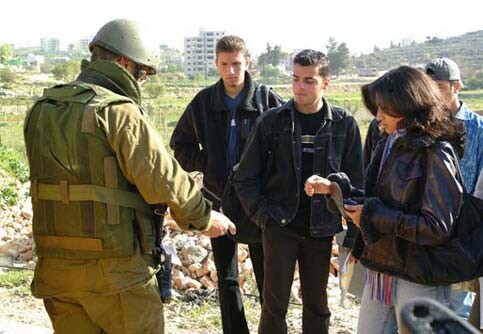
Despite orders to avoid the university, Israeli soldiers harassed students and demanded IDs for no apparent reason on 17 March 2004. (Birzeit University)
Only in March this year, two students from the internationally well-reputed Birzeit University in the West Bank were interrogated, humiliated and deported, without being given any explanation. The European female student was called a prostitute for having had a relationship with a Palestinian man, accused of having separatist tendencies for coming from a German-speaking minority in northern Italy, and asked why she didn’t study Hebrew instead of Arabic. The American student received even worse treatment. He was strip searched, yelled at, called an “arsehole”, had his face photographed as if he were a criminal, and when it transpired he was half-Arab the interrogator responded “what a pity, what a pity”.
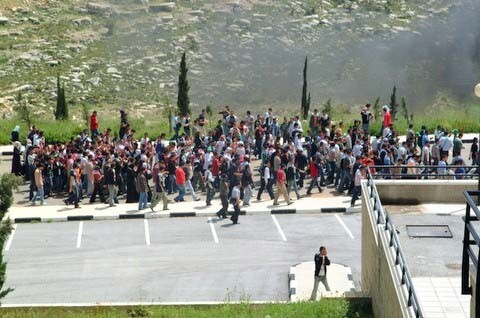
As Birzeit students headed to polling places for student council elections on 19th April 2006, Israeli occupation soldiers harassed and intimidated students, firing on them with tear gas and live ammunition. (Birzeit University)
University faculty members and staff with foreign passports undergo similar ordeals. Most have to leave the country every three months just like the foreign students despite having built their professional and family lives in the West Bank. They have no guarantees they will be able to stay from one visa application to the next. A few lucky ones are given 6-months visas from the Israeli military administration in the settlement of Bet El, but despite being allowed to make in-country applications, they still have no guarantees the application will be successful. If the pro-peace camp is serious about the sanctity of academic freedom, one of first things they should be actively protecting is the access of academic staff and students to Palestinian universities, especially if they are also serious about wanting a partner for dialogue. In March 2006, two faculty members of Birzeit University have had their visa renewals rejected, one of which has been deported. After being shouted at and humiliated by young soldiers, the faculty members were told they had abused the visa system – despite having never overstayed – and were denied re-entry. Both had been legally living in the West Bank since the 1990s and neither was given any explanation for why they had suddenly become a threat to Israel.
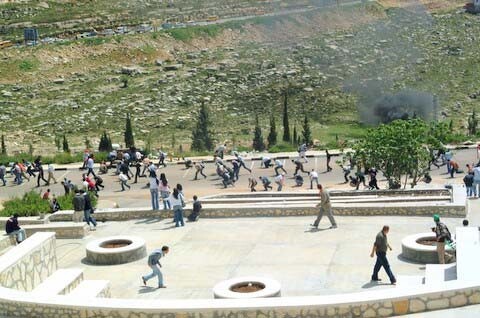
4 students were injured by live ammunition fired by Israeli soldiers at Birzeit students voting in student elections on 19 April 2006. (Birzeit University)
As arbitrary and outrageous as it already seems, the repression of Palestinian education casts its net even wider. In February 2006, a research student linked to a prestigious British university was detained for 8 hours, asked to become an informant for Israeli services and denied a visa for his PhD research. In April 2006, the wellknown assistant professor at Columbia University in New York, Joseph Massad, was refused entry to attend a conference at a university in the West Bank. In May 2006, the British human rights lawyer, Kate Maynard, was refused entry to attend a legal conference in Jerusalem, and less than one week ago, a volunteer with the Ramallahbased human rights research office Al-Haq, was deported.

Students duck from rubber-coated bullets; one student was shot on his arm and consequently fell and broke his foot as Israeli soldiers attacked students on election day at Birzeit, on 19 April 2006. (Magne Hagesater/Birzeit University)
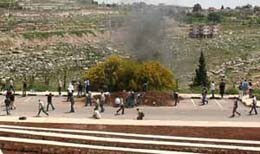
Israeli soldiers fire gas and rubber-coated bullets at students heading toward student council elections on 19 April 2006. (Magne Hagesater/Birzeit University)
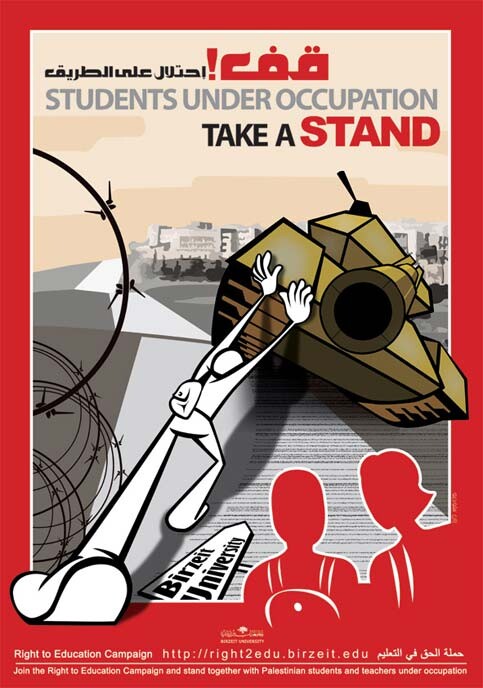
A poster developed by the Right to Education Campaign at Birzeit University.
If the asymmetries of the facts on the ground are not enough to justify the boycott of Israeli academia, then at the very least the limitations and pretence of the pro-dialogue argument must be realised. If there is no boycott of Israeli academia and current circumstances persist, Israeli academics would turn into the gatekeepers of any debate on Israel-Palestine – for only their freedoms would be secured by the Israeli state. What would be of the pro-dialogue, pro-peace anti-boycotters then? Where would they find their authentic ‘partners’ to dialogue with? The legitimacy of the fight for Israeli intellectual freedom is in itself dependant on there being the same freedom for Palestinians. Such a basic and fundamental point should be a no-brainer but yet it continues to be conveniently ignored by those claiming to have the most equitable and long-standing interests at heart.
The Right to Education Campaign was set up by Birzeit University to reach out to academics, students and campaigners worldwide to support the right to education in Palestine. Through ongoing monitoring and research on the issues affecting Palestinian education under occupation, as well as building an active campaign network in Palestine and worldwide, the Right to Education Campaign seeks to raise international awareness about the obstruction and denial of education in Palestine and to bring pressure to bear on governments, decision-makers and ultimately the Israeli authorities to guarantee safe and free access of all Palestinians to their educational institutions.
Related Links